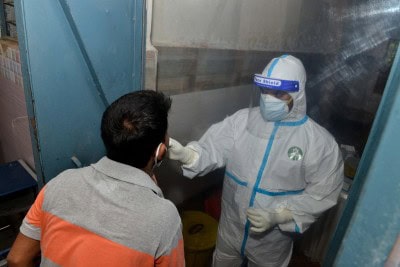By Aakanksha Khajuria
New Delhi, Nov 27 : Despite strong promises made by Delhi and central government to double the coronavirus testing in the national capital at the heights of the crisis, the city still has not witnessed any increase, with health experts attributing it to lack of manpower and infrastructure.
On November 15, massive spike in coronavirus cases had prompted Delhi Chief Minister Arvind Kejriwal to announce that his government would increase tests to one lakh.
Two days later, the central government had also pledged that the testing would be doubled. Despite their word of assurance, the scenario has yet to change.
The city had conducted 64,121 tests on November 11, highest so far, even before the commitment was made but since then the threshold has not been crossed.
The second highest number of tests were conducted on Thursday (63,266).
This shows that testing has not peaked even at the time the city is in the chokehold of a third wave of the pandemic.
Dr. RK Gupta, Member of Delhi Covid Committee constituted by the Kejriwal government, remarked, “It is easier to say that the testing will be increased, but the government should apprise how they will increase it. Making promises is easy but it is harder to uphold them. Be it any government, we must not speak beyond our capacity.”
The committee member, however, suggested that the tests can be doubled by increasing the manpower, centres, machines, working hours of peoples.
“It can only be done by using the capacity which is not being used at present. This is the only way.
“If a centre is testing from 8 a.m. to 12 p.m., the working hours should be increased by inducting more manpower.”
Former head of the epidemiology and communicable diseases at the Indian Council of Medical Research (ICMR), Dr Lalit Kant resonated a similar opinion and attributed it to manpower and infrastructural constraints, which he said will take some more time to overcome.
He, however, said that a new testing method, with more sensitivity, which will be rolled out by the IIT-Delhi in coming weeks will help in ramping up the testing. “Once it is available, results will be available in six hours-time. They are going to introduce it in couple of weeks. It is as good as RT-PCR,” Dr. Kant further said.
On being asked whether pool testing, in which samples of throat swabs of several individuals are mixed together and tested, should be adopted at this point, Dr. Kant said that methodology works better when the prevalence rate is very low, which is not the case in Delhi.
Seroprevalence in Delhi is estimated at 25.93 per cent.
Delhi is in the clutches of the third wave since October 28, when the daily rise in infections breached the 5,000-mark for the first time. It has witnessed 2,364 deaths in just a month since.
While 131 COVID-related deaths were recorded on November 18, the highest till date on a day, Delhi registered its highest single-day spike of 8,593 cases on November 11.
Health experts have attributed the surge in deaths to late hospitalization, shortage of ICU beds, winter season and rise in pollution levels are.
(Aakanksha Khajuria can be contacted at aakanksha.k@ians.in)
Disclaimer: This story is auto-generated from IANS service.

